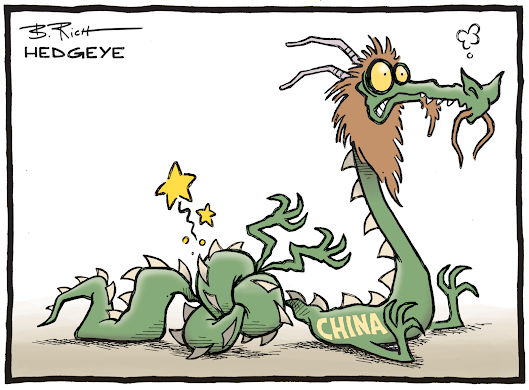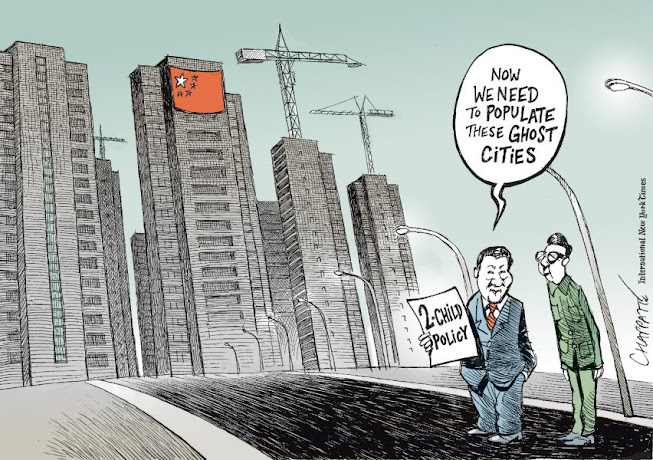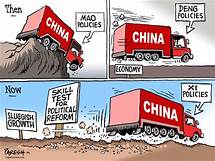China : Middle Kingdom to Mother Earth
- January 12, 2022
- Posted by: Lt Gen PR Shankar (Retd)
- Category: China

For the best part of the last decade we witnessed China’s ‘gravity defying’ rise. The immediate aftermath of the Chinese Virus opened the possibility of a new China Centric global order. In all this fancy talk, people forgot about two guys. Newton and Xi Jinping. Newtons gravitational theory reminds us that whatever goes up fast, comes down equally fast! The way the Chinese economy is gravitating to mother earth, from the Middle kingdom, Newton and his apple must be having the last laugh. Xi Jinping seems to have mastered the Chinese time machine. He has very clinically set China back into the Mao era. In the past six months, the visibility of this change has been dramatic. When you integrate the differentials which have surfaced, the emerging picture is that the China we are going to deal with in the future is a different one than the one we have dealt with so far. Hence let me attempt to outline the future as I see it despite being short sighted. As in all things China, one needs to look at two issues – its people and politics. Get a hang of this and the panorama presents itself. In my previous articles – Drivers of the Slow Melt and Something Unusual in my Peek Into Everyday China series I had outlined a few drivers which are propelling China to its destiny – however it pans out. Let us see these drivers from a people centric perspective to start with.
It is well established that real estate plus big tech and their allied industry/sectors which constitute anything between 25-30 % of China’s GDP are static or in reverse gear due to the regulatory crackdown of these sectors. When big firms and small firms alike are packing up or are shrinking, it means jobs and livelihoods being lost. When a young educated population starts looking for dreary government jobs even at lower pay scales, it marks the end of innovation, creativity and entrepreneurship. When people start losing tech jobs or are forced to accept pay cuts, upward mobility and ambition is replaced by fear and gloom. China has made cyber governance and AI its mantra for national rejuvenation. However its best and brightest are not working for that goal! Turn to real estate. Home ownership is a symbol of social status and financial strength in Chinese traditional culture. If the average Chinese has put his life savings in a flat in a ghost city, based on a debt bubble where does it leave him in his old age? He cannot live in the flat or will have no return of income on it. Alternately if he has paid for a flat with a beleaguered developer, then he ends up sans his saving or a flat. Either way his life savings will vanish like the bubble. Am I talking of something imaginary? No, this is the condition of the average Chinese citizen today. “Restrict this, cancel that. Regulate this, censor that… this country will become a cultural desert eventually” is what someone wrote on the social media platform Weibo..” Hu Xijin, the recently retired ‘dyed in the wool communist’ editor of Global Times, hopes that regulatory actions should help make most companies healthier instead of leaving them “dying on the operating table”. That is a telling comment.


Stabilising the shrinking population is critical to Chinese economy and growth. The government plans to reverse this with an incentivised three child policy after a two child policy did not work for a decade. The birth rates and marriages are plummeting as China ages at the fastest rate in recorded history. Headlines like Why are China’s Gen Z women rejecting marriage, kids more than their male counterparts? China population: without adequate pensions, more elderly say goodbye to their golden years and China population: article demanding Communist Party members have three children goes viral highlight the problem. The well-established trend line is that girls (especially working lot) do not want to get married and married couples cannot afford more children. There are surplus unmarried males. The populace is not heeding government edicts to increase population. Compare this with the way the ‘one child policy’ and population control measures were implemented by the earlier generation. They were either accepted enthusiastically by the people who were then under the spell of communist ideology or were forced into it with an iron hand. There is divergence between government policy expectation and ground reality. Combine this with the fact that the pension system and the social safety net for the aged is weak in China. The Chinese demography is skewed and insecure. We are also staring at a people who are showing two fingers to the CCP. It is a new era.
Mass testing and tracing, strict quarantines, extensive lockdowns, travel restrictions and border closings have been the cornerstones of China’s Zero Covid policy. While the rest of the world started living with the virus, an authoritarian China attempts to live without it… When hungry people start trading coffee for eggs and cigarettes for instant noodles, due to food shortages during lockdowns, there are grass root problems. When medical shortages set in and treatment is denied during lockdowns, the disaffection increases. When tens of thousands of people get locked up in centralized quarantine facilities to stop the virus, and messages like “The district security guards are like prison guards and we are like prisoners” start popping up it is time to take note. When people have to stand in line at five am on a cold winter morning for a couple of hours in pyjamas to get tested, it is a bad experience. When locked up residents are given a white radish, a head of cabbage, three potatoes, a carrot and two zucchinis as official supply during quarantine they cannot be a happy lot! People under lockdown from small-business owners to private-sector employees – might not have income for a whole month, but still have to pay every cent of their rent and mortgage, plus living expenses. The people are getting fatigued and paying a high price. Economically, the policy has dampened consumption and growth during a deteriorating fiscal situation. Raw material import prices and logistics costs have been skyrocketing due to eat away at profits. Further China’s political attitude in dealing with the virus has turned away export markets. Resultantly employment levels in firms has dropped anywhere between 10-50% depending upon the industry. The cost of China’s zero-Covid policy is steadily increasing. With the more transmissible virus variants yet to take hold in China, as they will, domestic economic resilience through ‘dual-circulation’ model, Xi Jinping’s economic brainchild – will fail. I have always expressed the thought that as long as the virus endures, it will debilitate China more than anyone. My belief is being reinforced with each passing day.


Last year, news reports of people having pool parties without masks made everyone envy China. The transition from pool parties, into eating a white radish, a head of cabbage, three potatoes, a carrot and two zucchinis is bad. From any metric, it is clear that the 1.4 billion Chinese people are in a pressure cooker situation. If that is the promised rejuvenation of the Chinese Middle Kingdom, thank god, we in India, are on mother earth. Contrast the current Chinese situation with the situation in USA, India or EU which once looked beleaguered and were the targets of cheap and derisive Chinese humour! Other countries have withered the worst effects of the Virus. China is yet to fully face it with its dodgy vaccines. The worst is yet to come. Reports are now emerging that India will be the fastest growing economy and US will outgrow China in 2022. People outside China are far better off than the Chinese. Hence there is a ‘Peoples’ problem in China which will keep increasing as its economy deteriorates. Its economy will continue to deteriorate as its politics continues in the current framework.
The ‘hide your strength bide your time’ formula of Deng was propelling China to be a superpower. However it was also imperceptibly democratising China. The wealth inequalities were making China look more like a capitalist country. The big tech firms were circumventing the government and threatening to supplant the communists in some form. This was anathema to Xi Jinping and the CCP. It was coming down to the fact that CCP was facing a choice – whether to do good for the country or to stay in power. In the recent past I have been opining that the CCP will prefer to be in power of a China which is not a superpower rather than being out of power in Superpower China. The CCP has chosen to be in power at the expense of China. To its fortune – good or bad – cometh the hour and cometh the man and thence came Xi Jinping.


Xi Jinping is a man cut from the Mao cloth. He has changed China’s politics, economics, foreign policy and diplomacy. As per him “China is facing a severe national security situation, with unprecedented external pressure, traditional security threats and non-traditional security threats are intertwined, ‘black swan’ and ‘gray rhino’ events can occur from time to time”. His personal ambition is to be the greatest visionary in Chinese history who is melding the best of Mao’s ‘cultural revolution’ and Deng’s ‘opening up’ while avoiding the pitfalls of Gorbachev’s, ‘glasnost and perestroika’. The outcomes are building the greatest military on earth, wolf warriors, the zero covid policy, dual circulation, and common prosperity programs based on ‘Xi’s Thoughts’. As he seeks an unprecedented third term at the helm reshuffles are taking place so that his inner circle loyalists take up key posts. Competitors are being purged through corruption issues. His grip on the party is tightening. Despite this, questions are being raised on the current declining macro-economic trends by those who built the Chinese economy under the Deng, Jiang and Hu regimes. These people represent a political opposition to Xi’s hard core loyalists, however small they are.


History suggests that by the time any leader assumes power in a third term, he becomes counterproductive to his nation. If Xi Jinping succeeds, as it seems he will, there will be further consolidation of power through purges of loyalists of Deng, Jiang and Hu. China will continue on his inward looking economic policies and outwardly aggressive diplomatic and military postures. If Xi Jinping returns to power, the economic decline of China which has set in will continue. It will be accentuated by additional military expenditure. However to offset this decline he will have to undertake a military adventure in Taiwan or against India as I have explained earlier. In the event of Xi Jinping not retaining power, the new leader whoever it is will purge his opposition, and endure a period wherein China will have to stabilise itself. He will have to look inward to consolidate. Both these eventualities will be reinforced by a common factor – as long as the Virus lasts, China will have to contend with it ceaselessly.
Look at it any way. The people are in for a spell of long uncertainty. Whether Xi Jinping stays in power or not , the Chinese decline will endure. The problem is its rising and fast expanding military capability. History suggests that China was militarily most aggressive when it was in economic turmoil. It undertook the Korean War, 1962 war with India, and developed it nuclear capability in 1964 as it was enduring the great famine and the disaster of Mao’s great leap forward. The Vietnam campaign was fought when China was economically weak. Here comes Xi cut in the Mao mould with his kind of policies to reverse the Chinese economic miracle. He has put together a greater military capability than Mao ever had. Will he repeat history by taking China to war again?
